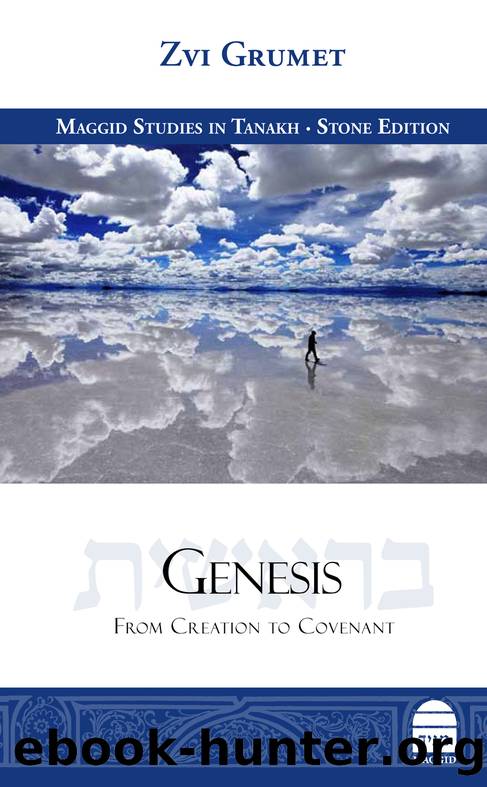Genesis: From Creation to Covenant by Grumet Zvi

Author:Grumet, Zvi [Grumet, Zvi]
Language: eng
Format: epub
Publisher: Maggid Books
Published: 2017-08-22T00:00:00+00:00
The first lekh lekha ( 12:1)
The second lekh lekha ( 22:2 )
God said to Abram,
Lekh lekha from your aretz ,
your moledet ,
and your beit av ,
to go to the land
which I will show you.
He said,
Take, please, your son,
your only son,
the one you love,
Isaac!
And lekh lekha to the land of Moriah.
And bring him up there as a burnt-offering
on one of the mountains which
I will tell you.
Both lekh lekha calls include an instruction to go to an unspecified place, and both seem to identify the mission using multiple terms: aretz , moledet , and beit av in the first; âyour son,â âyour only son,â and âthe one you loveâ in the second. Yet while aretz , moledet , and beit av apparently refer to three distinct entities, the identifiers in the second lekh lekha serve to progressively narrow the focus in order to leave no room for ambiguity, climaxing with the sonâs name â Isaac! 5
This unambiguous focusing heightens the crisis into which God corners Abraham. Let us recall that for Abraham, the primal son is Ishmael; Abraham is both ambivalent about Isaacâs birth and reluctant to send Ishmael away. Abrahamâs subsequent relationship with Isaac is a matter for speculation â the text is silent about that (until they trek together to Mount Moriah). Yet God opens this story demanding that Abraham first acknowledge Isaac as his son, then acknowledge that Isaac is the only son (confirming Ishmaelâs expulsion as final), and finally to acknowledge his love for that only son.
One can easily imagine this call to Abraham in slow motion, with pauses in between each demand â or even as a process taking multiple years. It is only after Abraham makes the internal moves to accept Isaacâs uniqueness and status that God commands Abraham to sacrifice the very one he has learned to love. 6 The challenge for Abraham is as much intensely personal as it is theological.
AMBIGUITY PURSUES ABRAHAM
The clarity and laser-like focus on Isaac in the second lekh lekha call stand in stark contrast to the ambiguity of what to do with him. This ambiguity is evident only in the original Hebrew text and is lost in any translation. God tells Abraham, âVehaalehu sham leâola ,â using both the verb form and the noun form of the root a-l-h. Literally, that root means âto go up,â so that the form of the first verb used here literally means, âRaise him up.â That could certainly imply sacrifice, but it could also mean something as simple as âBring him up to the mountain.â 7
To further complicate matters, while the meaning of the word ola (based on the same root, a-l-h) in sacrificial terms unambiguously refers to a burnt-offering, in Genesis that definition is less than clear since Genesis precedes the sacrificial order first presented in Exodus. In fact, prior to this incident, there is only one sacrifice mentioned in the entire Torah. 8 The ambiguities in both the noun and the verb lead the medieval scholar Rabbi Yosef Bekhor Shor to comment:
The Holy One, blessed be He, spoke in unclear terms.
Download
This site does not store any files on its server. We only index and link to content provided by other sites. Please contact the content providers to delete copyright contents if any and email us, we'll remove relevant links or contents immediately.
The Lost Art of Listening by Michael P. Nichols(7506)
Why I Am Not A Calvinist by Dr. Peter S. Ruckman(4153)
The Rosicrucians by Christopher McIntosh(3520)
Wicca: a guide for the solitary practitioner by Scott Cunningham(3179)
Signature in the Cell: DNA and the Evidence for Intelligent Design by Stephen C. Meyer(3138)
Real Sex by Lauren F. Winner(3023)
The Holy Spirit by Billy Graham(2952)
To Light a Sacred Flame by Silver RavenWolf(2823)
The End of Faith by Sam Harris(2742)
The Gnostic Gospels by Pagels Elaine(2531)
Waking Up by Sam Harris(2461)
Nine Parts of Desire by Geraldine Brooks(2369)
Jesus by Paul Johnson(2362)
Devil, The by Almond Philip C(2332)
The God delusion by Richard Dawkins(2309)
Heavens on Earth by Michael Shermer(2284)
Kundalini by Gopi Krishna(2185)
Chosen by God by R. C. Sproul(2164)
The Nature of Consciousness by Rupert Spira(2108)
